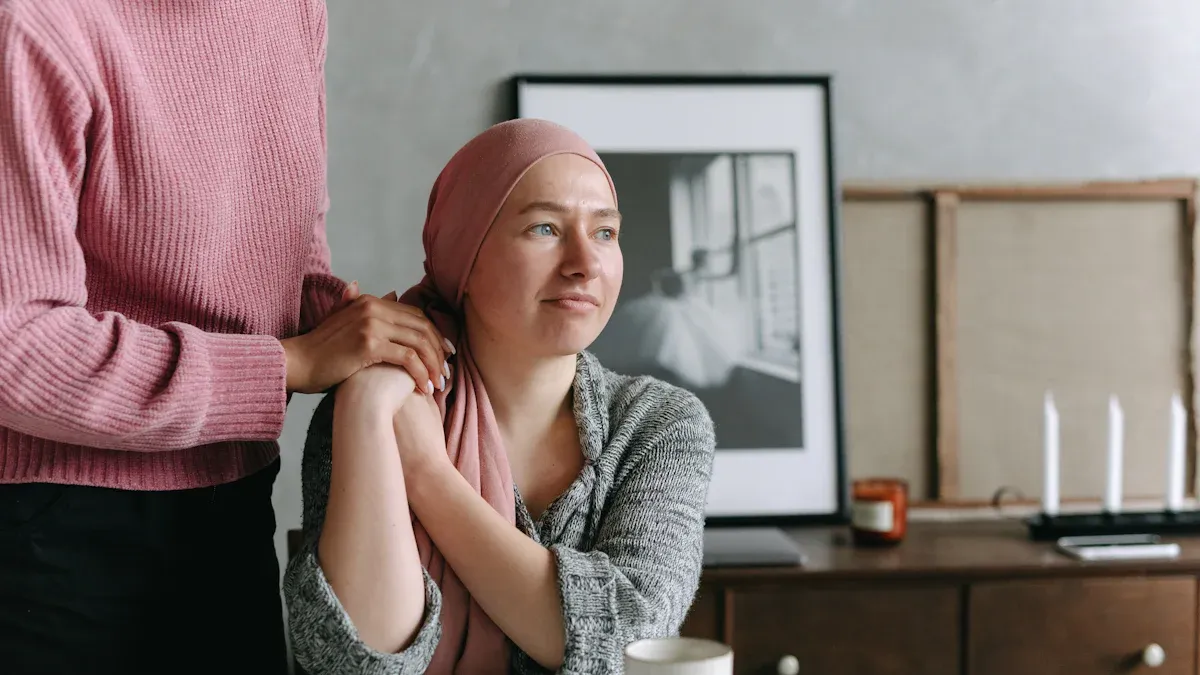Mindfulness Strategies to Ease Stress During Chemotherapy

Chemotherapy can feel like an uphill battle, both emotionally and physically. You might find yourself overwhelmed by anxiety or struggling with fatigue. Studies show that younger patients often experience heightened anxiety and depression during treatment, while breast cancer patients describe this period as one of the most distressing in their lives. Managing stress during this time isn’t just helpful—it’s essential. Patients who practice stress-reducing techniques, like mindfulness, report up to a 40% drop in stress symptoms and a 35% decrease in anxiety. Mindfulness strategies to alleviate stress during chemotherapy can help you regain a sense of calm and control, even on the toughest days.
Key Takeaways
Mindfulness can help lower stress and worry during chemotherapy. This can improve both your feelings and your health.
Easy activities like deep breathing and body scan meditation can reduce stress. They can also make your life feel better.
Writing in a journal and being thankful can help you handle emotions. It can also help you think more positively.
Making a calm space and using mindfulness apps can improve your practice. These tools can help you stick with it.
Joining mindfulness groups or getting help from experts can give you support. It can also keep you motivated while healing.
Understanding Stress During Chemotherapy
Emotional Challenges During Treatment
Chemotherapy can stir up a whirlwind of emotions. You might feel anxious, sad, or even angry at times. These feelings are completely normal, but they can take a toll on your mental health. Studies show that younger patients often face higher levels of anxiety and depression during treatment. For example, research on colorectal cancer patients found that emotional challenges like anxiety and depression significantly impacted their quality of life. Mindfulness interventions have been shown to help reduce these feelings, improving emotional well-being and overall quality of life.
It’s also important to acknowledge how suppressing emotions can affect your recovery. Research highlights that chronic stress from emotional suppression can slow healing. On the flip side, maintaining a positive attitude and seeking emotional support can enhance your recovery process.
Physical Effects of Stress on the Body
Stress doesn’t just affect your mind—it impacts your body too. Chronic stress can lead to digestive problems, headaches, and trouble sleeping. It’s also linked to heart disease, high blood pressure, and a weakened immune system. During chemotherapy, when your body is already working hard to fight cancer, these effects can make things even harder.
Stress can also make you more vulnerable to infections and increase feelings of fatigue. That’s why finding ways to manage stress is so important. By reducing stress, you give your body a better chance to heal and recover.
Importance of Stress Management for Healing
Managing stress isn’t just about feeling better emotionally—it can also improve your physical health. A study on breast cancer patients undergoing chemotherapy found that a 6-week online mindfulness program significantly reduced stress and improved both psychological and physical well-being. These findings suggest that stress management techniques, like mindfulness strategies to alleviate stress during chemotherapy, can lead to better treatment outcomes.
When you take steps to manage stress, you’re not just helping your mind—you’re supporting your body’s healing process too.
Mindfulness Strategies to Alleviate Stress During Chemotherapy

What is Mindfulness?
Mindfulness is all about staying present. It’s the practice of paying attention to your thoughts and feelings without judging them. Instead of worrying about the future or dwelling on the past, mindfulness encourages you to focus on the here and now. This approach helps you manage tough emotions by reducing self-criticism and promoting acceptance.
The concept of mindfulness has roots in Buddhist teachings, particularly the idea of 'sati,' which emphasizes awareness and presence. In the late 1970s, Jon Kabat-Zinn introduced Mindfulness-Based Stress Reduction (MBSR) as a therapeutic tool. Originally designed to help people with chronic pain, MBSR has since become a popular method for managing stress and improving overall well-being.
Benefits of Mindfulness for Cancer Patients
Mindfulness offers several benefits for individuals undergoing chemotherapy. Here’s a quick look at how it can help:
Benefit | Description |
|---|---|
Mindfulness practices help in lowering stress during treatment. | |
Improved emotional well-being | Patients report better emotional health through mindfulness. |
Enhanced quality of life | Overall life quality improves with mindfulness techniques. |
By incorporating mindfulness strategies to alleviate stress during chemotherapy, you can experience these positive changes. Whether it’s through meditation, breathing exercises, or guided imagery, mindfulness can make a real difference in how you feel.
How Mindfulness Supports Stress Reduction and Healing
Mindfulness doesn’t just help you feel calmer—it also supports your body’s healing process. Techniques like Mindfulness-Based Stress Reduction (MBSR) have been shown to reduce anxiety and improve the quality of life for cancer patients. These practices can also help you manage side effects like nausea and fatigue, giving you practical tools to cope with the challenges of treatment.
Staying present through mindfulness encourages you to engage fully in your healing journey. Studies show that remote-based mindfulness programs significantly reduce sleep disturbances and may even help with fatigue and pain. By focusing on the present moment, you can create a sense of calm that supports both your emotional and physical recovery.
Mindfulness strategies to alleviate stress during chemotherapy aren’t just about relaxation—they’re about empowering you to take an active role in your well-being.
Practical Mindfulness Strategies
Deep Breathing Techniques
Deep breathing is one of the simplest ways to calm your mind and body. It helps you focus on your breath, slowing your heart rate and reducing stress. You can try rhythmic breathing by inhaling for four counts, holding for four counts, and exhaling for six counts. This technique encourages relaxation and brings your attention to the present moment.
Research shows that mindful breathing can significantly lower perceived stress. A study found that practicing mindful breathing for just five minutes, three times a day, over three months led to noticeable improvements in mindfulness and stress reduction. You don’t need any special equipment—just a quiet space and a few minutes of your time.
Body Scan Meditation
Body scan meditation is another effective way to ease stress. This practice involves mentally scanning your body from head to toe, noticing areas of tension or discomfort. By focusing on each part of your body, you can release built-up stress and feel more connected to yourself.
Studies have shown that body scan meditation can reduce pain and improve sleep quality for cancer patients. In an 8-week mindfulness program, participants reported less anxiety and depression, along with better overall well-being. You can try this technique lying down or sitting comfortably. Start at the top of your head and slowly work your way down, paying attention to how each part of your body feels.
Guided Imagery for Relaxation
Guided imagery uses your imagination to create calming mental pictures. It’s like taking a mini-vacation in your mind. You might picture yourself walking on a beach, sitting in a peaceful forest, or floating on a calm lake. This practice helps shift your focus away from stress and toward relaxation.
A clinical study involving women undergoing chemotherapy found that guided imagery improved their quality of life and emotional well-being. Participants felt more relaxed and experienced less mood disturbance. You can use audio recordings or apps to guide you through this process, making it easy to incorporate into your routine.
Mindfulness strategies like these can make a big difference during chemotherapy. They help you manage stress and feel more in control of your journey.
Mindful Journaling for Emotional Release
Writing down your thoughts can be a powerful way to process emotions during chemotherapy. Mindful journaling allows you to express feelings that might otherwise feel overwhelming. By putting pen to paper, you create a safe space to explore your emotions without judgment. This practice can help you release stress and gain clarity.
Research supports the benefits of journaling for emotional well-being:
A 2012 study found that expressive writing significantly improved the quality of life for individuals with early-stage breast cancer.
You don’t need to write pages to feel the benefits. Start small by setting aside five minutes a day. Focus on how you’re feeling in the moment or reflect on something that brought you peace. Over time, this habit can help you better understand your emotions and feel more in control of your journey.
Tip: If you’re not sure where to start, try prompts like “What am I feeling right now?” or “What’s one thing I’m grateful for today?”
Practicing Gratitude to Shift Perspective
Gratitude might seem like a small thing, but it can have a big impact on your mental health. When you focus on what you’re thankful for, you shift your attention away from stress and toward positivity. This doesn’t mean ignoring challenges—it’s about finding moments of light even in tough times.
Studies show that practicing gratitude improves psychological well-being. For example:
Evidence Type | Description |
|---|---|
Scientific Study | Gratitude reduces symptoms of depression and anxiety, enhancing mental health. |
Personal Account | Christina, a cancer patient, found emotional resilience through gratitude journaling. |
Research Findings | Gratitude boosts sleep quality, mood, and immunity while lowering depression. |
Practical Application | Oncology nurses recommend gratitude practices to help patients cope emotionally. |
You can start practicing gratitude by keeping a simple gratitude journal. Each day, write down three things you’re thankful for. These could be as small as a kind word from a friend or as big as finishing a round of treatment. Over time, this practice can help you feel more grounded and resilient.
Note: Gratitude doesn’t erase difficulties, but it helps you see the good alongside the hard moments.
Mindfulness Strategies to Alleviate Stress During Chemotherapy, like journaling and gratitude, empower you to take an active role in your emotional well-being. These practices remind you that even small steps can lead to meaningful changes.
Incorporating Mindfulness into Your Routine

Starting with Short, Simple Practices
If you’re new to mindfulness, starting small can make it feel less overwhelming. Short, simple practices like mindful breathing are a great way to begin. For example, you can try a five-minute breathing exercise where you focus on your inhale and exhale. This helps calm your mind and reduce stress.
Research shows that even brief mindfulness practices can be effective. Here’s what studies have found:
Study Focus | Participants | Intervention | Findings |
|---|---|---|---|
Mindful breathing effects on perceived stress | Cancer patients | Five-minute mindful breathing practice | Demonstrated feasibility and effectiveness in stress reduction. |
Mindfulness-based stress reduction for breast cancer patients | 6-week online mindfulness program | Reduced stress levels and related symptoms among participants. | |
Effects of mindful breathing on stress | Cancer patients | Five-minute mindful breathing practice | 84% adherence; effective stress management technique. |
You don’t need to dedicate hours to mindfulness. Just a few minutes a day can make a noticeable difference in how you feel.
Creating a Peaceful Environment
Your surroundings play a big role in how well you can focus on mindfulness. A peaceful environment helps you feel more relaxed and present. You don’t need a fancy setup—just a quiet corner with minimal distractions. Adding a soft blanket, a candle, or calming music can make the space feel more inviting.
Studies highlight the importance of creating a calming environment for mindfulness. For instance:
Study Focus | Findings |
|---|---|
Mindfulness in Breast Cancer | Mindfulness-based stress reduction helps cope with treatment-related stress, improving psychological and physical well-being. |
Mindfulness in Colorectal Cancer | Mindfulness interventions improve emotional, cognitive, and social functions, reducing negative emotions and enhancing quality of life. |
By setting up a peaceful space, you create the perfect atmosphere to focus on your well-being.
Leveraging Apps and Guided Resources
Mindfulness apps and guided resources can make it easier to stick to your practice. Apps like Calm, Headspace, or Insight Timer offer guided meditations, breathing exercises, and relaxation techniques tailored to your needs. These tools are especially helpful if you’re unsure where to start or need extra support.
A study on mindful breathing practices found that participants who used guided resources three times daily for three months experienced significant stress reduction. With an 84% adherence rate, this approach proved both practical and effective for chemotherapy patients. Regular use of these tools can help you build a consistent mindfulness routine and feel more in control of your stress.
Tip: Try exploring a few apps to see which one feels right for you. Many offer free trials, so you can test them before committing.
Establishing a Consistent Practice
Building a consistent mindfulness practice can feel like a challenge at first, but starting small makes it manageable. Think of it as creating a new habit—just like brushing your teeth or drinking water in the morning. The key is to make mindfulness a regular part of your day, even if it’s just for a few minutes.
Here’s why consistency matters:
A 6-week online mindfulness program for women undergoing chemotherapy showed significant reductions in stress and related symptoms.
Regular mindfulness practices can improve mood, reduce anxiety, and help manage physical symptoms like fatigue and pain.
Patients who incorporate mindfulness into their routine often report better emotional well-being and an overall improvement in their quality of life.
To get started, pick a time of day that works best for you. Maybe it’s right after waking up or before going to bed. Set a reminder on your phone or pair mindfulness with an existing habit, like drinking your morning tea. Over time, these small efforts add up, helping you feel more grounded and in control.
Tip: Don’t worry about being perfect. Even a few minutes of mindfulness each day can make a big difference.
Joining Mindfulness Groups or Seeking Professional Guidance
You don’t have to navigate mindfulness alone. Joining a group or working with a professional can provide the support and structure you need to stay on track. Many cancer centers and community organizations offer mindfulness programs tailored to patients like you.
Here’s what the research says about group mindfulness practices:
Patients participating in Mindfulness-Based Stress Reduction (MBSR) programs have experienced a 40% reduction in stress symptoms.
Anxiety levels dropped by 35% among participants, making it easier for them to cope with treatment.
Oncology experts note that MBSR can enhance the effectiveness of cancer treatments by reducing depression and improving overall quality of life.
Being part of a group also connects you with others who understand what you’re going through. Sharing experiences and learning together can make mindfulness feel less intimidating and more rewarding. If groups aren’t your thing, consider seeking guidance from a trained mindfulness coach or therapist. They can tailor practices to your needs and help you stay motivated.
Note: Many mindfulness groups meet online, so you can join from the comfort of your home.
Mindfulness can be a powerful ally during chemotherapy. It helps you manage stress, improve emotional well-being, and support your body’s healing process. By staying present and practicing techniques like deep breathing or journaling, you can create moments of calm even on the hardest days.
Remember: You don’t have to do it all at once. Start small. Try one technique that feels right for you and build from there.
Even a few minutes of mindfulness each day can make a difference. Over time, these small steps can lead to big improvements in how you feel—both physically and emotionally. Give it a try. You’ve got this!
FAQ
What if I don’t have time for long mindfulness sessions?
You don’t need long sessions to benefit from mindfulness. Start with just 2–5 minutes a day. Try deep breathing or a short guided meditation. Small, consistent efforts can still make a big difference in reducing stress.
Tip: Set a timer or pair mindfulness with a daily habit, like brushing your teeth.
Can mindfulness help with chemotherapy side effects?
Yes, mindfulness can help manage side effects like nausea, fatigue, and pain. It reduces stress, which supports your body’s healing process. Techniques like body scan meditation or guided imagery can also improve sleep and emotional well-being.
Do I need special equipment to practice mindfulness?
Not at all! Mindfulness doesn’t require any special tools. You just need a quiet space and a few minutes. Apps or guided meditations can help, but they’re optional. Your breath and attention are the only essentials.
How do I stay motivated to practice mindfulness?
Staying motivated can be tough, but joining a group or using an app can help. Celebrate small wins, like feeling calmer after a session. Remember, mindfulness is about progress, not perfection.
Note: Consistency matters more than duration. Even a little mindfulness each day adds up over time.
Can I practice mindfulness while doing other activities?
Absolutely! Mindfulness isn’t just about sitting still. You can practice while walking, eating, or even folding laundry. Focus on the sensations, smells, or sounds around you. This keeps you present and helps reduce stress.
Example: While eating, notice the taste and texture of each bite.
See Also
Symptoms And Treatments Of Choroid Plexus Carcinoma Explained
Exploring Symptoms And Treatments For Duodenal Cancer
A Guide To Symptoms And Treatments Of Conjunctival Melanoma
Key Insights Into Adrenocortical Adenoma Symptoms And Treatments
Essential Information Regarding Symptoms Of Adrenocortical Carcinoma

